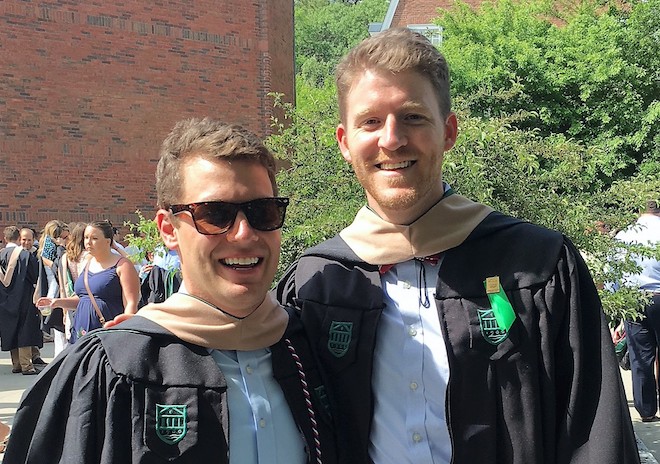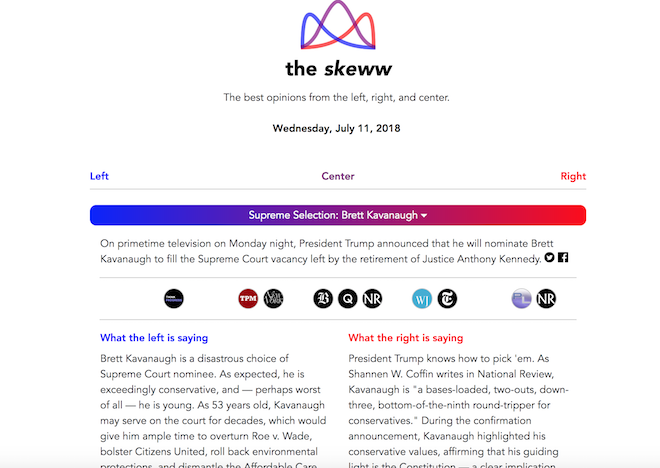
Keal Harter (left) and Sean Graber have founded a media platform called The Skeww that they hope will create civil political discourse. Courtesy photo
When Sean Graber left Virtuali, the management consulting company he co-founded in Buenes Aires, Argentina to enroll at Dartmouth’s Tuck School of Business, he still had entrepreneurship on the brain. Graber wanted to use Tuck’s small class size to find a co-founder and an idea. It took leaving the country as part of Tuck’s Onsite Global Consulting class, but Graber found his co-founder while consulting with classmates in Germany for three weeks.
Keal Harter came to Tuck after serving in the U.S. Navy as an officer for six years. With a background in political science, the Holland, Michigan native kicked it off with Graber from the get-go, mainly over late-night political conversations and the end of long days consulting.
“We’d have some great conversations, and sometimes drag our teammates into them,” Graber, 33, jokes.
Despite having some different beliefs, the two realized that they could have constructive and civil conversations — an increasingly rare ability since the presidential elections in 2016, when the two first enrolled at Tuck. “Sometimes we agree, sometimes we disagreed, but we realized that you could have a civil conversation,” Graber, originally from Basking Ridge, New Jersey, says. If they could have these conversations, why couldn’t they scale that, the two thought. And now, nearly two years after they first enrolled at Tuck, they are doing just that with their news curation site, newsletter, and podcast, called The Skeww.
The Skeww takes the day’s trending political news stories and using machine learning and human judgement, aligns what media outlets are reporting on a political spectrum from left to right. For example, on July 10, the three topics are a poll that says 91% of American voters believe civility in politics is a problem, the trade war, and the upcoming European NATO Summit. On the right side for the NATO Summit, The Federalist with the headline “Trump Is Not To Blame For NATO Chaos, Nor Breaking The Liberal Order.” On the left is The Daily Kos, which ran the headline “On Eve Of NATO Summit, Trump Is Still Throwing Incoherent Twitter Fits.”
BUILDING A TECH STARTUP WITH NO TECH BACKGROUND
Building a tech startup — and trying to bring civility to one of the most uncivil times in recent political history — would not be an easy task. Neither Graber or Harter had a background in computer science or building a website. “It was a lot of late nights and a lot of googling obscure error messages, but we have created something here,” Graber says. Tapping into many resources at Tuck and the Dartmouth community, Graber was able to teach himself enough coding chops to build the site and begin working on the machine learning system. “When you’re an MBA and don’t have that background, it’s sometimes tough to find the resources that can help you get from zero to one,” Graber says. But he was able to overcome some of those deficiencies by taking the Natural Language Processing elective and spending time in Dartmouth’s DALI Lab where he was able to pick the brains of computer science undergraduate and graduate students.
Graber and Harter both believe the friendly and nurturing confines of a business school and university were an ideal place to launch a venture. “At any business school, there are so many different opportunities that it’s sometimes hard to give those up to just work on something,” Graber admits. But on the other hand, “You’re not going to have that nurturing environment outside of school,” he says.
No doubt the added time and support allowed them to take a product to market to test.
“We are trying to create a forum in which we can try to facilitate civil exchange in an era of bitter partisanship,” Harter, 32, says.
FOSTERING CIVIL DISCOURSE
Right now, the technology uses web scraping tools to pull thousands of articles. They are then able to pick out what is trending and what people are talking about that. Graber and Harter the hone in on those topics and using their machine learning and human judgement, selected articles are put through a vocabulary rubric and placed on a political spectrum and summaries are written based on the articles. “The idea is to build a discussion,” Harter says. “We are very cognizant of going article-by-article and using that rubric.”
Graber says compared to other media outlets and news sources, there is nothing quite like their’s.
“There is really nothing out there that takes ideas from the left and the right and gives it to you in a highly curated format,” he believes.
The site has only been fully live for less than a month, but the duo say they’ve seen strong day-over-day traffic growth so far. Both Graber and Harter have accepted full-time positions but plan to keep the site going on the side. Right now, the goal is just to see if it resonates with people and can build an audience and community. If strong growth continues, they might try to monetize it with ads, a paywall, or separating premium services.
“Reasonable people will be able to argue the placement of the article on the spectrum,” Harter says. “But that’s not what we’re trying to do. We don’t want to have the most absolutely precise bias model. We want to be accurate, but what we’re trying to do is foster understanding and constructive conversations.”
DON’T MISS: MEET DARTMOUTH TUCK’S MBA CLASS OF 2019 or CONSIDERING AN MBA AT TUCK? DON’T BE A JERK










